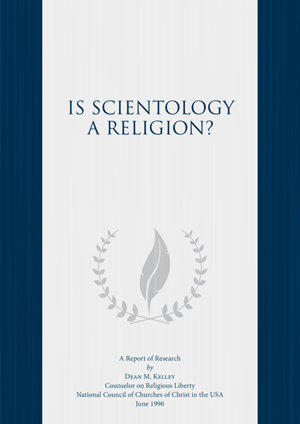ABOUT THE EXPERTISE
In this report from 1996, legal scholar and Methodist minister Dean M. Kelley addresses the question of “whether Scientology is a religion in a legal sense,” including according to criteria then acknowledged by the Internal Revenue Service in the United States. His findings were based on interviews conducted with twenty-one Scientologists at Churches in Sacramento, California; Albuquerque, New Mexico; Washington, DC; and Clearwater, Florida. “The purpose of the interviews was not to determine the teaching or tenets of Scientology,” he asserts, “but to determine what Scientology was doing for the adherent.” With this perspective in mind, he observed that Scientology occupied a centrally important role in the lives of his interviewees and provided a means to overcome personal problems, such as “drug addiction, alcoholism, frustration, aimlessness, depression, or a sense of futility,” and in the process realize their true nature as spiritual beings through the practicality of Dianetics and Scientology. On all counts—legal or theological—Mr. Kelley finds that Scientology abundantly qualifies as a religion. Several of his findings “help to reinforce the conclusion that Scientology is a religion,” as he writes, including the confessional nature of auditing, the Creed of Scientology that includes the precept that humanity is essentially good, marriage ceremonies, and global social betterment and humanitarian programs supported by the Church. These, in turn, support the “Aims of Scientology.” As L. Ron Hubbard wrote in 1965: “A civilization without insanity, without criminals and without war, where the able can prosper and honest beings can have rights, and where Man is free to rise to greater heights, are the aims of Scientology.”
BIOGRAPHY
Dean M. Kelley (1926–1997) was a legal scholar, an executive for religious liberty with the National Council of Churches (NCC) of the USA, and a board member of the American Civil Liberties Union (ACLU). He received his undergraduate degree from Denver University (1946) and his master’s in theology from the Iliff School of Theology (1949), and served as a minister for the United Methodist Church. His published works included Why Conservative Churches are Growing (1972); Why Churches Should Not Pay Taxes (1977); and Government Intervention in Religious Affairs (edited, 1982).

Scientology, Social Science and the Definition of Religion
by James A. Beckford, Professor of Sociology, University of Warwick, England

Social Change and New Religious Movements
by Bryan R. Wilson,
Emeritus Fellow in Sociology, Oxford University

The Church of Scientology
by Juha Pentikäinen, Marja Pentikäinen, University of Helsinki, Finland

The Relationship Between Scientology and Other Religions
by Fumio Sawada, Eighth holder of the secrets of Yu-itsu Shinto, the oldest religion in Japan; President, Ahlul-Bait Center

The Religious Nature of Scientology
by Geoffrey Parrinder, Methodist minister, Professor, Comparative Study of Religions, University of London

Religious Philosophy, Religion and Church
by G.C. Oosthuizen, Professor of Science of Religion, University of Durban-Westville, Natal, South Africa

Scientology a New Religion
by M. Darrol Bryant, Department of Religious Studies, Renison College, University of Waterloo, Ontario, Canada

Apostates and New Religious Movements
by Bryan R. Wilson,
Emeritus Fellow in Sociology, Oxford University

Scientology: An Analysis and Comparison of its Religious Systems and Doctrines
by Bryan R. Wilson,
Emeritus Fellow in Sociology, Oxford University

The Reliability of Apostate Testimony About New Religious Movements
by Lonnie D. Kliever Ph.D., Professor of Religious Studies

The Sea Organization and its Role Within the Church of Scientology
by Frank K. Flinn Ph.D. Adjunct Professor in Religious Studies

Brief Analyses of the Religious Nature of Scientology
by J. Gordon Melton, Baylor University, Samuel Hill, Gary Bouma, Irving Hexham

Congregational Services of the Church of Scientology
by Bryan R. Wilson,
Emeritus Fellow in Sociology, Oxford University

Is Scientology A Religion?
by Alan W. Black, Associate Professor of Sociology, University of New England, Armidale, New South Wales, Australia

Is Scientology a Religion?
by Dean M. Kelley, National Council of Churches

Religious Toleration & Religious Diversity
by Bryan R. Wilson,
Emeritus Fellow in Sociology, Oxford University

Scientology A Religion In South Africa
by David Chidester, Professor of Comparative Religion, University of Cape Town, South Africa

Scientology: A True Religion
by Urbano Alonso Galan, Professor of Philosophy and Theology, Gregorian University of Rome

Scientology: A Way of Spiritual Self-Identification
by Michael Sivertsev, Moscow Academy of Sciences

Scientology: A Worshipping Community
by Lonnie D. Kliever, Southern Methodist University, Dallas, Texas

Scientology and Contemporary Definitions of Religion in the Social Sciences
by Alejandro Frigerio, Professor of Sociology, Catholic University of Argentina, Buenos Aires

Scientology and Islam an Analogous Study
by Fumio Sawada, Eighth holder of the secrets of Yu-itsu Shinto, the oldest religion in Japan; President, Ahlul-Bait Center

Scientology and Religion
by Christiaan Vonck, Rector, Faculty for Comparative Study of Religion, Antwerp, Belgium

Scientology: A Comparison with Religions of the East and West
by Per-Arne Berglie, Professor of History of Religion, University of Stockholm

Scientology Its Cosmology, Anthropology, System of Ethics and Methodologies
by Régis Dericquebourg, Professor of Sociology of Religion, University of Lille III, France

Scientology – Its Historical-Morphological Frame
by Dario Sabbatucci, Professor of History of Religions, University of Rome

Scientology: Its True Nature
by Harri Heino, Professor of Theology, University of Tampere, Finland

Scientology: The Marks of Religion
by Frank K. Flinn, Adjunct Professor of Religious Studies Washington University

